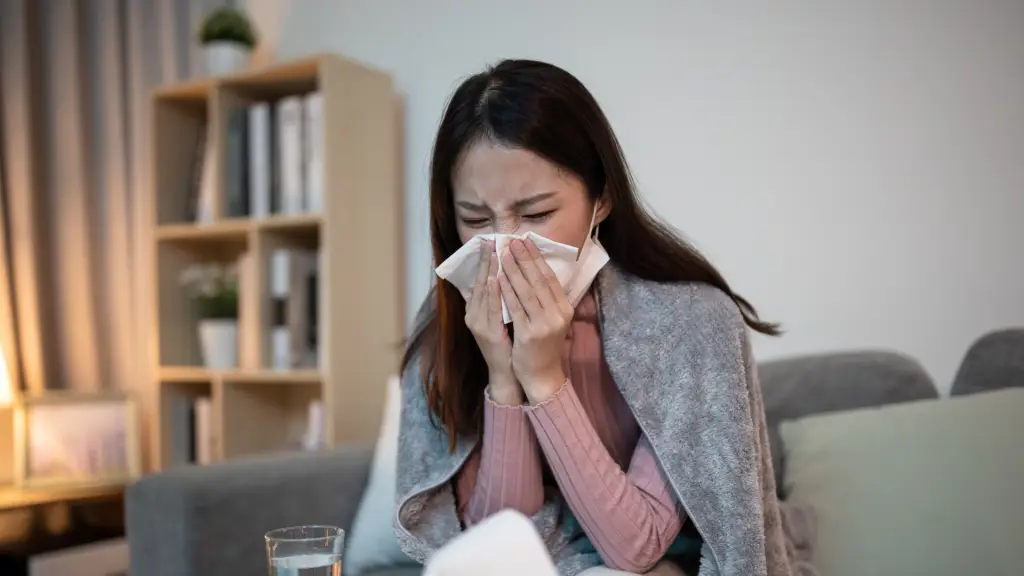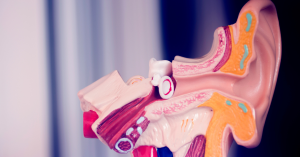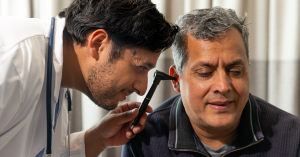There’s nothing quite like the misery of a head cold—stuffed nose, sore throat, watery eyes, and that telltale pressure behind your ears. But one symptom often catches people off guard: sudden hearing loss or muffled sounds. If you’ve ever wondered, “Why does my hearing drop when I have a cold?”—you’re not alone.
The answer lies in the interconnectedness of your ear, nose, and throat. When a cold takes hold, it doesn’t just clog your sinuses—it can also impact the tiny mechanisms that help you hear clearly. For most people, this results in temporary hearing loss, ear pressure, or the feeling of “fullness” in one or both ears.
But what exactly causes this drop in hearing during a cold? How long does it last? And what can you do to relieve it? In this article, we’ll explore the surprising cause behind cold-related hearing loss, how to recognize it, when it’s a concern, and how to protect your ears the next time you catch a bug.
How the Ear, Nose, and Throat Are Connected
You might not realize it, but your ears, nose, and throat are all part of the same system — and when one area is inflamed, the others can be affected almost instantly. That’s why something as simple as a head cold can muffle your hearing, create ear pressure, or even cause temporary hearing loss.
The Role of the Eustachian Tube
At the center of this connection is the Eustachian tube — a narrow channel that links the middle ear to the back of your throat. It serves three main functions:
Equalizing air pressure between your middle ear and the outside world.
Draining mucus and fluid from the middle ear.
Protecting the ear from pathogens entering from the nasal passages.
Under normal circumstances, your Eustachian tube opens briefly when you swallow, yawn, or chew, helping balance pressure and keep your ears clear.
Why Cold Symptoms Impact Hearing
When you catch a cold, your body produces excess mucus and inflammation in your nasal passages and sinuses. This congestion can lead to:
Swelling or blockage of the Eustachian tube
Trapped fluid in the middle ear
Unequal pressure that causes the eardrum to retract or bulge
As a result, sound waves don’t travel properly through the middle ear, leading to a type of temporary hearing loss called conductive hearing loss — where sound can’t “conduct” efficiently from the outer to the inner ear.
This can create symptoms like:
Muffled or reduced hearing
“Popping” or “crackling” sensations
A feeling of fullness or pressure in the ear
Difficulty hearing others clearly, especially in one ear
Even mild nasal congestion can affect your ears due to this shared anatomical system — which is why ENT doctors treat these areas together.
What Happens to Your Ears During a Cold?
If you’ve ever felt like you’re underwater or wearing earmuffs during a cold, you’re experiencing the effects of fluid buildup, pressure changes, and inflammation inside your ears. This condition can significantly distort or dull your ability to hear — often on just one side, though both ears may be affected.
Mucus, Inflammation, and Fluid Buildup
When a cold virus enters your body, your immune system goes into defense mode. This includes:
Increased mucus production in your nasal passages and sinuses
Inflammation of the Eustachian tubes, making them narrower or completely blocked
Fluid accumulation in the middle ear due to drainage issues
When the Eustachian tubes can’t drain properly, the middle ear fills with fluid instead of air. This changes the way your eardrum vibrates, which interferes with the transmission of sound.
It’s similar to how your hearing feels during or after a flight when your ears haven’t “popped” — only in this case, the cause isn’t air pressure at altitude, but pressure imbalance and fluid congestion inside your head.
Conductive Hearing Loss Explained
This type of hearing reduction is called conductive hearing loss, and it’s the most common type associated with colds and sinus infections.
Here’s how it works:
The outer ear and inner ear are functioning normally.
The middle ear (filled with fluid and inflammation) fails to transmit sound properly.
Sound becomes muffled, dull, or blocked altogether.
Often, you’ll hear your own voice loudly (a phenomenon called autophony), but struggle to hear external sounds.
Fortunately, in most cases, this is temporary and improves as the inflammation resolves and fluid drains naturally. However, in some cases — especially if the fluid becomes infected — it can lead to an ear infection or longer-lasting problems.
Next, we’ll explore how long this hearing drop typically lasts and when it’s time to see a doctor.
How Long Will Cold-Related Hearing Loss Last?
The good news is that for most people, the hearing loss that comes with a cold is temporary. However, the duration can vary depending on the severity of your cold, your overall ear health, and whether complications like infection or chronic congestion occur.
Temporary vs. Persistent Symptoms
In most cases, hearing loss due to a cold:
Lasts between a few days to two weeks
Gradually improves as congestion clears and Eustachian tube function returns
May come and go, especially if symptoms fluctuate or worsen
You might notice:
One ear clears up faster than the other
Crackling or popping sounds as pressure equalizes
Improved hearing when lying down or after yawning or swallowing
However, persistent fluid, inflammation, or secondary infection can prolong symptoms.
When to See a Doctor
Seek medical advice if:
Your hearing loss lasts more than 2–3 weeks
You experience sharp or persistent ear pain
You develop fever, ear drainage, or signs of an ear infection
Hearing loss occurs suddenly or severely
Your symptoms return frequently (e.g., with every cold)
Chronic Eustachian tube dysfunction or middle ear effusion (fluid buildup without infection) may require:
Prescription decongestants or nasal corticosteroids
Antibiotics (if infection is present)
ENT evaluation
Tympanometry or audiology testing
In rare cases, ear tube placement
The key is to monitor symptoms carefully and get help if your hearing doesn’t bounce back. Prompt treatment reduces the risk of long-term damage or complications.
Next, we’ll go over at-home remedies and treatments to help speed up recovery and relieve ear-related symptoms during a cold.
At-Home Remedies and Treatments That Can Help
While most cold-related hearing loss resolves on its own, there are safe, effective ways to speed up recovery and minimize discomfort. The goal is to reduce inflammation, drain fluid, and restore pressure balance in the ears.
Clearing Ear Pressure Naturally
Here are some tried-and-true techniques to help equalize ear pressure:
1. Swallowing or Yawning Frequently
These natural actions encourage the Eustachian tube to open, helping balance inner ear pressure.
2. The Valsalva Maneuver
Pinch your nose
Close your mouth
Gently blow as if trying to exhale through your nose
This forces air through the Eustachian tubes and can help “pop” your ears.
3. Hydration and Warm Liquids
Drinking water and sipping warm tea or broth helps thin mucus and keeps your throat moist, improving drainage.
4. Nasal Irrigation
Using a saline nasal spray or a neti pot flushes out mucus and opens sinus pathways, indirectly relieving ear pressure.
Medications, Steam, and Rest
Over-the-counter remedies and self-care routines can also make a big difference:
Decongestants (e.g., pseudoephedrine or oxymetazoline nasal sprays) reduce nasal and Eustachian tube swelling.
Antihistamines help if your congestion is allergy-related.
Steam inhalation loosens mucus and soothes inflamed passages — try a hot shower or bowl of steaming water with a towel over your head.
Warm compresses placed over the ear can relieve pressure and discomfort.
Rest and immune support: Sleep, hydration, and vitamin C or zinc supplements support your body’s natural healing process.
Avoid using Q-tips or inserting anything into your ears — this can push wax or fluid deeper, worsening the blockage.
Up next, we’ll cover how to prevent ear-related hearing issues during future colds, especially if you’re prone to congestion or ear pressure.
Preventing Ear Issues During Future Colds
If you’ve experienced clogged ears or hearing loss from a cold before, chances are it could happen again. But with a few proactive steps, you can reduce the likelihood of ear involvement during future illnesses — and make recovery faster when symptoms do appear.
Strengthening Your Immune and Ear Health
Keeping your immune system strong reduces how often and how severely you catch colds, which in turn protects your ears.
Here’s how to support both:
Stay hydrated to keep mucus thin and easier to drain.
Eat immune-boosting foods like citrus, garlic, leafy greens, and yogurt.
Wash your hands regularly to prevent respiratory infections.
Avoid smoking or secondhand smoke, which increases Eustachian tube dysfunction.
Use a humidifier in dry environments to keep nasal passages moist.
Practice good allergy control, as allergic congestion can affect your ears too.
Early Intervention Tips
As soon as cold symptoms begin, take steps to prevent ear complications:
Start saline nasal spray or irrigation early to prevent blockage.
Use gentle decongestants at the first sign of sinus pressure.
Avoid flying or diving with nasal congestion to prevent severe pressure changes in the ears.
Treat symptoms consistently — don’t wait for ear pain or hearing loss to develop.
For individuals prone to chronic Eustachian tube dysfunction, consider regular ENT evaluations, especially if symptoms persist after each cold.
With mindful care and early action, you can greatly reduce the discomfort and hearing changes caused by future upper respiratory infections.
Conclusion: When a Cold Muffles More Than Your Nose
It’s easy to overlook your ears when you’re battling a runny nose or sore throat — but hearing changes during a cold are more common than most people think. That dull, muffled sensation or drop in hearing is usually the result of temporary Eustachian tube blockage, fluid buildup, and pressure imbalances.
The good news? For most people, this type of hearing loss is short-lived and reversible. With a bit of patience, care, and the right remedies, your ears will often clear up as your cold fades. But staying aware of the signs — and knowing when to seek medical advice — is essential to avoid complications.
Next time you’re stuffed up and can’t hear clearly, you’ll understand what’s really going on. And better yet, you’ll know what to do — so you can breathe easier and hear brighter, even in the thick of cold season.
FAQs About Hearing Loss During a Cold
Why does my hearing get worse when I have a cold?
Colds cause inflammation and mucus buildup that can block the Eustachian tubes. This creates pressure imbalances and fluid in the middle ear, resulting in temporary hearing loss.
Is hearing loss from a cold permanent?
No, in most cases it’s temporary and improves as congestion clears. However, prolonged symptoms or infections may lead to complications that need medical treatment.
How can I unclog my ears when I have a cold?
Try swallowing, yawning, nasal decongestants, saline rinses, or the Valsalva maneuver. These help open the Eustachian tubes and relieve pressure.
Should I see a doctor if my hearing doesn’t return after a cold?
Yes. If hearing loss persists for more than 2–3 weeks, or if you experience pain, fluid drainage, or fever, consult an ENT specialist.
Can allergies cause the same type of hearing issue as a cold?
Yes. Seasonal or environmental allergies can cause similar congestion and Eustachian tube dysfunction, leading to temporary hearing issues.
How can I prevent ear problems during future colds?
Act quickly at the first sign of congestion. Use hydration, nasal sprays, humidifiers, and manage allergies to keep Eustachian tubes clear.






